pep小学英语四个时态及其练习
小学英语四种时态重点及其练习
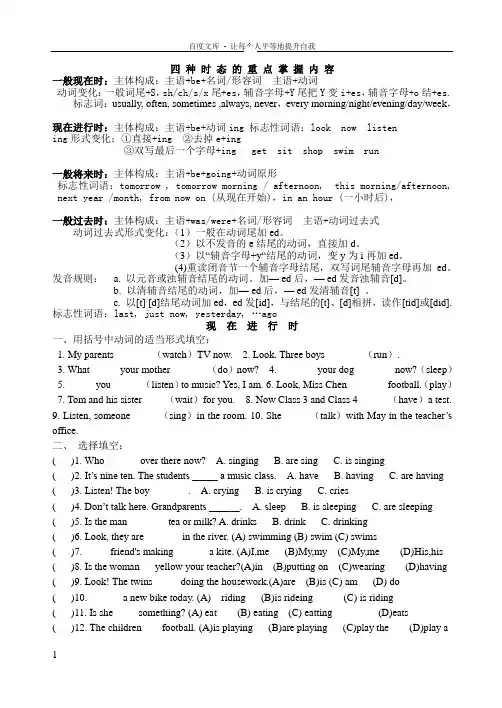
四种时态的重点掌握内容一般现在时:主体构成:主语+be+名词/形容词主语+动词动词变化:一般词尾+S,sh/ch/s/x尾+es,辅音字母+Y尾把Y变i+es,辅音字母+o结+es.标志词:usually, often, sometimes ,always, never,every morning/night/evening/day/week,现在进行时:主体构成:主语+be+动词ing 标志性词语:look now listening形式变化:①直接+ing ②去掉e+ing③双写最后一个字母+ing get sit shop swim run一般将来时:主体构成:主语+be+going+动词原形标志性词语:tomorrow , tomorrow morning / afternoon, this morning/afternoon, next year /month, from now on (从现在开始),in an hour (一小时后),一般过去时:主体构成:主语+was/were+名词/形容词主语+动词过去式动词过去式形式变化:(1)一般在动词尾加ed。
(2)以不发音的e结尾的动词,直接加d。
(3)以“辅音字母+y“结尾的动词,变y为i再加ed。
(4)重读闭音节一个辅音字母结尾,双写词尾辅音字母再加ed。
发音规则: a. 以元音或浊辅音结尾的动词。
加— ed后,— ed发音浊辅音[d]。
b. 以清辅音结尾的动词,加— ed后,— ed发清辅音[t] 。
c. 以[t] [d]结尾动词加ed,ed发[id],与结尾的[t]、[d]相拼,读作[tid]或[did]. 标志性词语:last, just now, yesterday, …ago现在进行时一、用括号中动词的适当形式填空:1. My parents _______(watch)TV now.2. Look. Three boys _______(run).3. What _____ your mother _______(do)now?4. _______ your dog _______ now?(sleep)5. _____ you ______(listen)to music? Yes, I am.6. Look, Miss Chen _______ football.(play)7. Tom and his sister ____(wait)for you.8. Now Class 3 and Class 4______(have)a test.9. Listen, someone _____(sing)in the room. 10. She _____(talk)with May in the teacher’s office.二、选择填空:( )1. Who ______ over there now? A. singing B. are sing C. is singing( )2. It’s nine ten. The students _____ a music class. A. have B. having C. are having ( )3. Listen! The boy _______. A. crying B. is crying C. cries( )4. Do n’t talk here. Grandparents ______. A. sleep B. is sleeping C. are sleeping ( )5. Is the man _______ tea or milk? A. drinks B. drink C. drinking( )6. Look, they are _______in the river. (A) swimming (B) swim (C) swims( )7. _____friend's making ______ a kite. (A)I,me (B)My,my (C)My,me (D)His,his ( )8. Is the woman __ yellow your teacher?(A)in (B)putting on (C)wearing (D)having ( )9. Look! The twins_____ doing the housework.(A)are (B)is (C) am (D) do( )10. _____a new bike today. (A) riding (B)is rideing (C) is riding( )11. Is she ____ something? (A) eat (B) eating (C) eatting (D)eats( )12. The children____football. (A)is playing (B)are playing (C)play the (D)play a( )13. They ____ TV in the evening. (A)are watching (B)can't watching (C)don't watch ( )14. They are _____ their clothes.(A)makeing (B)putting (C)put away (D)putting on ( ) 15. Listen! She ____ in the classroom. (A)is singing (B)sing (C)to sing (D)is sing 三、按要求进行句型转换:! Lily is dancing.(改一般疑问句)_________________________________________2. Kate is looking for her watch.(改否定句)________________________________________3. Mrs. White is watching TV.(划线提问)_________________________________________4. I am doing homework.(改否定句)__________________________________________5. They are waiting for you at the library.(划线提问)_____________________________一般将来时一、选择题( ) ____ a meeting tomorrow. A. is going to be B. will go to be( ) next month. A. won’t work B. working C. isn’t going to working( )3. He ___ busy this week A. will be B. is; C. will be; D. is( ) ____a football match tomorrow. A. was B. is going to have C. will have( )5. ____ you ___ free tomorrow? Are; going to B. Are; going to be C. Are; going to( )6. Mother ___ me a present on my next birthday. A. will gives B. will give C. gives ( )7. He _____ her a hat on her next birthday. A. gives B. will giving D. is going to give ( )8. He _____ to us as soon as he gets there. A. writes B. has written C. will write( )9. He _____ in three days. A. came back B. will come back C. is going to coming back ( ) ____the work this way next time. A. do B. will do C. going to do D. will doing( ) he ____a kite in the park. A. will flys; B. will flying C. is going to fly;( ) they ___a volleyball match. A. will watching B. watches C. is watching( ) _____ a party tomorrow. having going to have having( )14. ___ you ____free next Sunday? A. Will; are B. Will; be C. Do; be D. Are; be ( )15. He ________ there at ten tomorrow morning. A. will B. is C. will be D. be二句型转换1. Nancy is going to go camping.(改否定)Nancy ________ going to go camping.2. I’ll go and join them.(改否定)I _______ go ______ join them.3. I’m going to get up at 6:30 tomorrow.(改一般疑问句)________ _______ ________ to get up at 6:30 tomorrow?4. We will meet at the bus stop at 10:30.(改一般疑问句)_______ ________ meet at the bus stop at 10:30.5. She is going to listen to music after school.(对划线部分提问)________ _______ she ________ ________ _________ after school?6. My father and mother are going to see a play the day after tomorrow.(同上)_________ _________ going to see a play the day after tomorrow.7. Today is a sunny day. We _______ (have) a picnic this afternoon.8. My brother _____(go) to Shanghai next week.9. Tom often _____ (go) to school on foot. But today is rain. He ______(go) to school by bike.10. What do you usually do at weekends? I usually____(watch) TV and ______(catch) insects?11. What ________(do) you do last Sunday? What _______(do) next Sunday?12. Mary _____ (visit) her grandparents tomorrow一般现在时一. 用所给动词的适当形式填空:1.Mike__________ (like) cooking. 2. She__________ (go) to school from Monday to Friday.3. He often_______ (have) dinner at home.4. Daniel and Tommy _______ (be) in Class One.5. There_____ (be) some water in the bottle.6. Don’t make a noise. Gr andpa __________(sleep).7. It’s seven now, Tom’s family__________(watch) TV.8. It ________(take) me two hours to finish my homework last night.9. She often_______(wash) clothes in the evening.10. She______ (don’t do) homework every day. 11. The girl______ (teach) English on Sundays.12. There ________ (be) a football match on TV this evening.13. Your parents__________ (read) newspapers every day.14. What they often__________ (do) on Saturdays? 15. We ______ (not watch) TV on Monday.16. they__________ (like) the World Cup. 17. Nick________ (not go) to the zoo on Sunday.18. Liu Tao__________ (do) not like PE.19. Jenny and Danny usually______(play) games in the afternoon .二.单项选择:1. Jenny____ English every evening. A has study B studies C study D studied2. Wang Mei ____ music and often ____ to music. A like; listen B likes; listens C like; are listening D liking ; listen3. The picture _______ nice. A. looks B. is looked C. look D. is looking4. He ______ a good friend. A. having B. have C. to have D. has5. One of the boys_____ a black hat. A have B there is C there are D has三、按照要求改写句子1. Daniel watches TV every evening.(改否定句) ______________________________________2. I do my homework every day.(改一般疑问句) ________________________________3. She likes milk.(改为一般疑问句) ____________________________________________4. Amy likes playing computer games.(改一般疑问句)________________________________5. We go to school every morning.(改否定句)_____________________________________6. He speaks English very well.(改否定句)________________________________________7. I like taking photos in the park.(划线提问)_________________________________________8. John comes from Canada.(划线提问)_____________________________________________9. She is a good student.(改一般疑问句否定回答)____________________________________10. Simon and Daniel like going skating.(否定句)___________________________________一般过去时一、用动词的适当形式填空。
pep小学英语四个时态及其练习打印
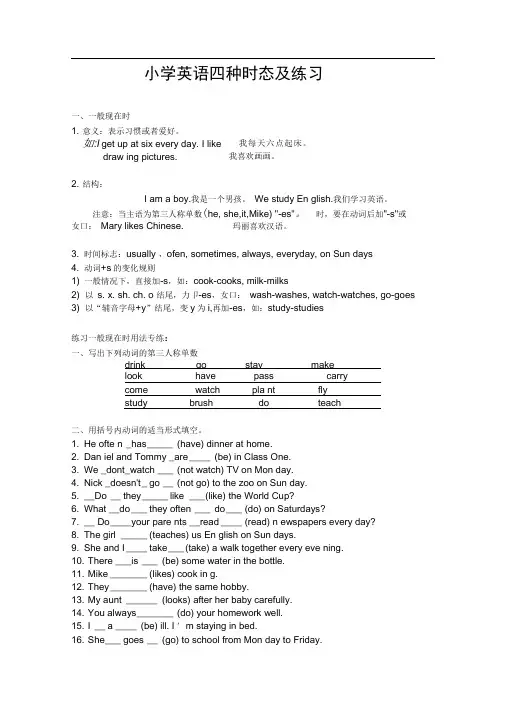
小学英语四种时态及练习一、一般现在时1. 意义:表示习惯或者爱好。
如:I get up at six every day. I like draw ing pictures. 2. 结构:I am a boy.我是一个男孩。
We study En glish.我们学习英语。
注意:当主语为第三人称单数(he, she,it,Mike) "-es"。
女口: Mary likes Chinese. 玛丽喜欢汉语。
3. 时间标志:usually ,ofen, sometimes, always, everyday, on Sun days4. 动词+s 的变化规则1) 一般情况下,直接加-s ,如:cook-cooks, milk-milks2) 以 s. x. sh. ch. o 结尾,力卩-es ,女口: wash-washes, watch-watches, go-goes 3) 以“辅音字母+y ”结尾,变y 为i,再加-es ,如:study-studies练习一般现在时用法专练: 一、写出下列动词的第三人称单数二、用括号内动词的适当形式填空。
1. He ofte n _has _____ (have) dinner at home.2. Dan iel and Tommy _are ____ (be) in Class One.3. We _dont_watch ___ (not watch) TV on Mon day.4. Nick _doesn't _ go __ (not go) to the zoo on Sun day.5. __Do __ they _____ like ___ (like) the World Cup?6. What __do ___ they often ___ do ___ (do) on Saturdays?7. __ Do ____your pare nts __read ____ (read) n ewspapers every day?8. The girl _____ (teaches) us En glish on Sun days.9. She and I ____ take ___ (take) a walk together every eve ning. 10. There ___is ___ (be) some water in the bottle. 11. Mike _______ (likes) cook in g.12. They _______ (have) the same hobby.13. My aunt ______ (looks) after her baby carefully. 14. You always _______ (do) your homework well. 15. I __ a ____ (be) ill. I ' m staying in bed. 16. She ___ goes __ (go) to school from Mon day to Friday.我每天六点起床。
小学英语四大时态总结及练习题
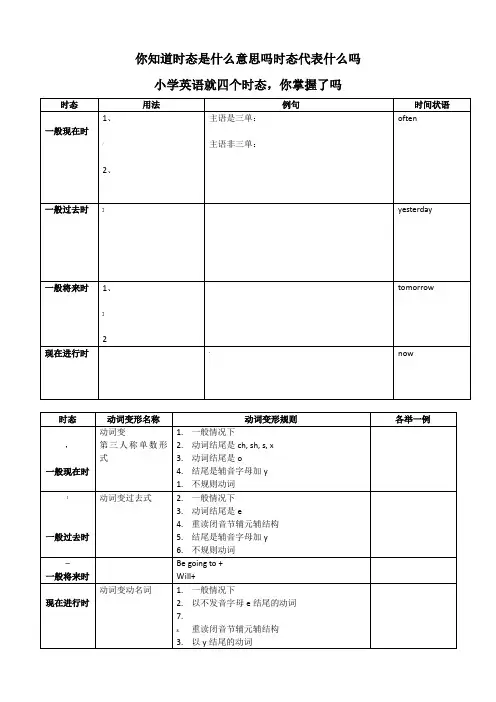
你知道时态是什么意思吗时态代表什么吗小学英语就四个时态,你掌握了吗你能发现它们之间的共同点和不同点吗勤加练习,百战不殆I.把下列动词变为第三人称单数形式。
1. clean--2. go--3. have--4.do-6. fly--7. come-- brush-9. watch-- 10. study-- 11. ask--(13. swim-- 14. catch-- 15. write--16. eat-- 17. make-- 18. paint—19. learn-- 20. phone-- 21. run—22. hop-- 23. sing-- 24. pick—II.把下列动词变成过去式is\am________ fly______ plant________are________ drink_________ play_______go________ make ______ does_________dance________ worry________ ask _____ taste_________ eat__________ draw________put ______ throw________kick_________ pass_______ do ________III.把下列动词变成动名词形式。
Wake________ make__________ come____________have____________!Take_________ leave__________ rid_________, regret__________, Begin________,cut________, get_________, hit_________, run_________, set_________, sit__________, spit__________, stop_________, swim________,beg_________, drop__________, fit_________, nod_________, dig___________, forget_________, travel_________visit_________Carry_________ enjoy___________ play ___________ study ________die_________ lie_________多加练习,百战不殆之时态篇一、用单词的正确形式填空:1.Mike _________ (do) his homework every day.2.There __________(be) some water in the glass.3.We like ________ (play) basketball after class.4.I like singing. I often _________(listen) to the music in the evening.5.【6.My grandma_________(watch) TV every day.二、判断句子的正误, 并改正。
(完整版)PEP小学英语四种时态练习题及答案
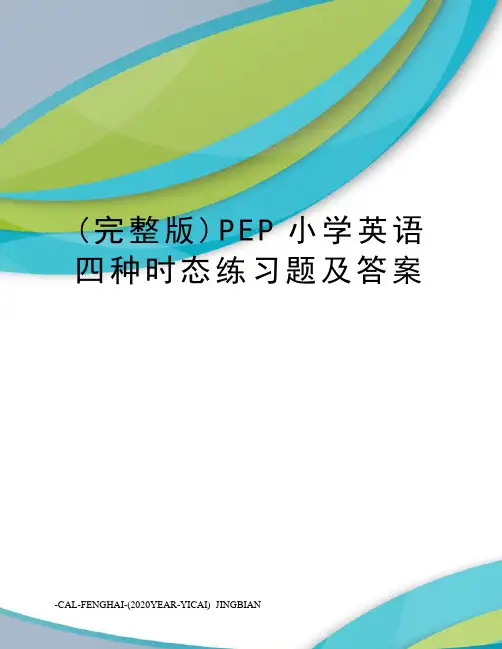
(完整版)P E P小学英语四种时态练习题及答案-CAL-FENGHAI-(2020YEAR-YICAI)_JINGBIAN一般现在时练习题一、写出下列动词的第三人称单数形式。
eat read do take washwatch have carry study f lycatch go have cook looksing teach like get come play二、用单词的正确形式填空:1.Mike ___________ (do) his homework every day.2. There ____________ (be) some water in the glass.3.We like ____________ (play) basketball after class.4.I like singing. I often ____________ (listen) to the music in the evening.5.My grandma ___________ (watch) TV every day.三、选择最佳的答案:1. ____Alice often play the piano. No, she _____.A. Do; doB. Does; doesC. Does; doesn't2. ___ your penfriend __ in BeijingA. Do; liveB. Do; livesC. Does; live3. Tom and Mike __ very excited, they will take a trip.A. isB. areC. am4. I like ________ very much. What about you?A. danceB. dancedC. dancing5. I can’t find my pen. Let me __.A. go and ask herB. go and ask hersC. go and ask she6. Fangfang is a good student. She ____maths.A. does good atB. well do itC. is good at7. The kite ____ a bird. A. look like B. is looking C. looks like8. Bill and I ___ good friends.A. isB. areC. am9. Sandy often ___ his homework on Sundays .A. doB. doesC. did10. What do you usually do on the weekend I __________.A. went swimmingB. go swimmingC. visited grandparents11. What do you usually do on your holiday?A. saw elephantsB. sing and danceC.took picture12. I ____ a student. I go to school ____bus every day.A. is; byB. am; onC. am; by13. I ____ a brother. She ____ a sister.A. have; hasB. has; hasC. have; have14. You ____ a student. He ____ a teacher.A. is; isB. are; isC. are; are15. He always _____ football games.A. watchesB. watchC. doesn't16. My best friend _____ shells.A. collectsB. collectC. often17. She doesn’t _____ listening to the music.A. oftenB. likeC. likes18. My mother and I ___ always watch romantic films.A. doesn’tB. don’tC. do19. ---When _____ he get home on Friday?----He gets home at four on Friday. A. do B. does C. did现在进行时练习题一、写出下列单词的现在分词:do play dance sitmake swim jump cookclean watch come readeat write sing gorun fly catch help二、用单词的适当形式填空:1. look! Chen Jie and Mike are ___________(sing)now.2. The small bear is ________ (climb) the tree.3. Mike is ________ (draw) picture.4. She is ________ (do) the dishes.5. My brother is ________ (make) kites.6. My father is ________ (read) a newspaper in living room.7. Ted is __________(answer) the phone.8. My uncle is ________ (drive) a car.9. The students are ________(listen) to their teacher carefully.10. Chen Jie is _________(wash) clothes.三、选择正确答案1. Every one ____ to their teacher in the classroom.A. are listeningB. is listeningC. listen2. They are singing and ___ together at the party now.A. danceB. dancedC. dancing3. Listen! The birds ____.A. is singingB. are singC. are singing4. Look! The kite ___ in the sky. A. fly B. flies C. is flying5. They ____ riding a forse. A. is B. are C. am6. Kate ____ playing chess. A. am B. is C. are7. Are you washing clothesA. Yes, you areB. Yes, I amC. No, I am8. Is he ____ TV?Yes, he is. A. watch B. watching C. not9. ____ they taking pictures. Yes, they are.A. AmB. BeC. Are10. It’s 10 o’clock. Ben _____ TV in the bedroom.A. watchB. is watchingC. watches四、根据中文填空。
四种时态及其练习(完整版)
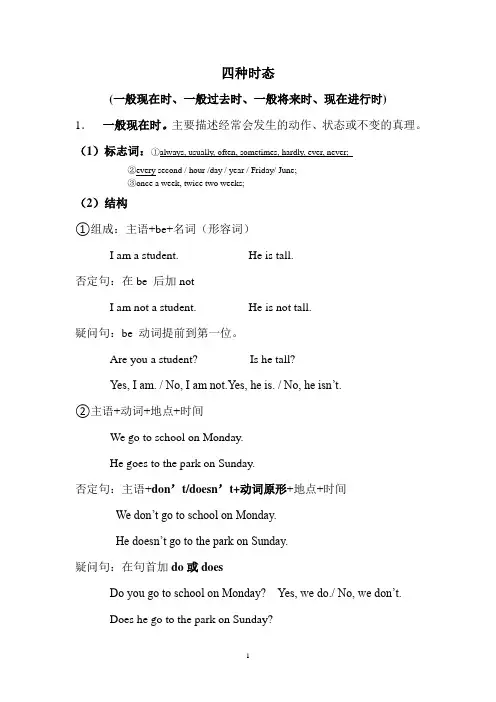
四种时态(一般现在时、一般过去时、一般将来时、现在进行时)1.一般现在时。
主要描述经常会发生的动作、状态或不变的真理。
(1)标志词:①always, usually, often, sometimes, hardly, ever, never;②every second / hour /day / year / Friday/ June;③once a week, twice two weeks;(2)结构①组成:主语+be+名词(形容词)I am a student. He is tall.否定句:在be 后加notI am not a student. He is not tall.疑问句:be 动词提前到第一位。
Are you a student? Is he tall?Yes, I am. / No, I am not.Yes, he is. / No, he isn’t.②主语+动词+地点+时间We go to school on Monday.He goes to the park on Sunday.否定句:主语+don’t/doesn’t+动词原形+地点+时间We don’t go to school on Monday.He doesn’t go to the park on Sunday.疑问句:在句首加do或doesDo you go to school on Monday? Yes, we do./ No, we don’t.Does he go to the park on Sunday?Yes, he does./ No, he doesn’t.(3)动词三单变化:①在原单词末尾加s , 如:like –likes②单词以o, sh, ch, s, x 结尾加es, 如:go –goes③单词末尾为辅音+y结尾去y加ies 如:study- studies2. 现在进行时:主要叙述正在发生的事情。
PEP版小学英语四种时态复习
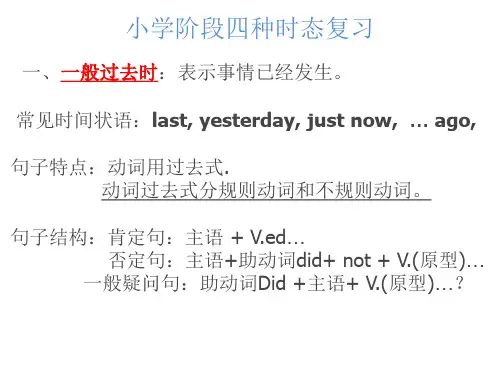
be动词用过去式:am,is—was; are—were 句子结构: 肯定句:主语 + was/were… 否定句:主语 + was/were +not +… 一般疑问句:was/were+主语+…?
Eg 1. I was a student some years ago. I wasn’t a student some years ago. 否定:__________________________ Was I a student some years ago? 一般疑问句:________________________
小学阶段四种时态复习
一、一般过去时:表示事情已经发生。
常见时间状语:last, yesterday, just now, … ago,
句子特点:动词用过去式. 动词过去式分规则动词和不规则动词。 句子结构:肯定句:主语 + V.ed… 否定句:主语+助动词did+ not + V.(原型)… 一般疑问句:助动词Did +主语+ V.(原型)…?
eg:1. I am going to play football this afternoon. I am not going to play football this afternoon. 否定:__________________________
Am I going to play football this afternoon? 一般疑问句:______________________
2. They all went to the mountains yesterday morning. all didn’t go to the mountains yesterday morning. 否定:They __________________________
(完整版)四种时态及其练习(完整版)
四种时态(一般现在时、一般过去时、一般将来时、现在进行时)1. 一般现在时。
主要描述经常会发生的动作、状态或不变的真理。
(1) 标志词:① always, usually, often, sometimes, hardly, ever, n ever;②every second / hour /day / year / Friday/ June;③once a week, twice two weeks;(2) 结构①组成:主语+be+名词(形容词)I am a stude nt. He is tall.否定句:在be后加notI am not a stude nt. He is not tall.疑问句:be动词提前到第一位。
Are you a stude nt? Is he tall?Yes, I am. / No, I am not.Yes, he is. / No, he isn ' t.②主语+动词+地点+时间We go to school on Mon day.He goes to the park on Sun day.否定句:主语+don' t/doesn' t+动词原形+地点+时间We don' t go to school on Mon day.He does n ' t go to the park on Sun day.疑问句:在句首加do或doesDo you go to school on Mon day? Yes, we do./ No, we don ' t.Does he go to the park on Sun day?Yes, he does./ No, he does n (3) 动词三单变化:① 在原单词末尾加s ,如:like - likes② 单词以 o, sh, ch, s, x 结尾力口 es,女口: go - goes ③ 单词末尾为辅音+y 结尾去y 加ies 女口: study- studies 2.现在进行时:主要叙述正在发生的事情。
四大时态按要求完成句子训练(讲义)人教PEP版英语六年级下册
人教版PEP六年级复习之四大时态、按要求完成句子训练Part A ——动词的时态之每天昨天今天和明天一般现在时1.一般现在时简介:主要描述经常会发生的动作、状态或不变的真理。
句中常出现____________________________________________________________________等.2.一般现在时的组成形式:主语+be+名词(形容词)I am a student.He is tall.We are friends.主语+动词原形+其它We go to school on Monday.He goes to school at seven in the morning.3.主语+情态动词can+动词原形+其它。
如:Tom can speak Chinese. A bird can fly.现在进行时1.现在进行时简介: 表示目前或目前阶段正在进行的动作。
句中常出现____________________________等.2.现在进行时的结构:人称+ _______________ + _______________一般将来时1.一般将来时简介:主要描述将来要发生的事情。
句中常出现______________________________________等.2.一般将来时的组成形式:主语+ _______________+动词原形主语+ _______________+动词原形★be going to = willI am going to go swimming tomorrow=I will go swimming tomorrow.一般过去时1.一般过去式简介: 表示过去某一时间发生的动作或存在的状态。
常和yesterday,last week(year),three days(weeks) ago,in 2003等时间状语连用2.一般过去式的组成形式:主语+be动词(was,were)+其它。
小学四种时态试题及答案
小学四种时态试题及答案一、一般现在时1. 我每天上学。
A. go to schoolB. goes to schoolC. am going to schoolD. am going to go to school答案:A2. 他经常帮助别人。
A. He often help others.B. He often helps others.C. He often helped others.D. He often helping others.答案:B3. 我们喜欢游泳。
A. We like to swim.B. We likes to swim.C. We liked to swim.D. We liking to swim.答案:A二、一般过去时4. 昨天我去了图书馆。
A. I go to the library yesterday.B. I went to the library yesterday.C. I am going to the library yesterday.D. I go to the library yesterday.答案:B5. 他们上周看了电影。
A. They watch a movie last week.B. They watched a movie last week.C. They are watching a movie last week.D. They will watch a movie last week.答案:B6. 她昨天买了一本书。
A. She buy a book yesterday.B. She bought a book yesterday.C. She is buying a book yesterday.D. She will buy a book yesterday.答案:B三、一般将来时7. 明天我要去看医生。
A. I am going to see a doctor tomorrow.B. I go to see a doctor tomorrow.C. I went to see a doctor tomorrow.D. I will go to see a doctor tomorrow.答案:A8. 他们将要参加比赛。
小学英语四种时态知识点加练习题.docx
如:Does he swim well ?
Yes, he does. / No, he doesn't.
特殊疑 句:疑+以does开 的一般疑 句?
如:How does your father go to work?
三.第三人称 数的 化 (只有在第三人称 主 的肯定句中, 才用三 式)
动作。结构:助动词be ( am / is / are ) +现在分词.
二、现在分词的构成:
1.大多数动词后可在动词后直接加-ing.
Eg: carry-carrying,catch-catching,drink-drinking, enjoy-enjoying hurry-hurrying,do-doing ,
小学英语四种时态知识点加练习
一、一般现在时
一.意 :表示 常 生的事情, 作或存在的状
二.构成及 化
1.be
的 化。
肯定句:主+be(am,is,are)+其它。如:I am a boy.
否定句:主+ be + not +其它。如:He is not a worker.
一般疑 句:Be +主+其它。如:-Are you a student?
否定句:主+ don't+原形(+其它)。如:we don’t play basketball after school.
一般疑 句:Do +主+原形+其它?
如:Do you often play basketball after school?Yes, we do. / No, we don't.
- 1、下载文档前请自行甄别文档内容的完整性,平台不提供额外的编辑、内容补充、找答案等附加服务。
- 2、"仅部分预览"的文档,不可在线预览部分如存在完整性等问题,可反馈申请退款(可完整预览的文档不适用该条件!)。
- 3、如文档侵犯您的权益,请联系客服反馈,我们会尽快为您处理(人工客服工作时间:9:00-18:30)。
小学英语四种时态及练习一、名词复数规则1.一般情况下,直接加-s,如:book-books, bag-bags, cat-cats, bed-beds 2.以s. x. sh. ch结尾,加-es,如:bus-buses, box-boxes, brush-brushes, watch-watches3.以“辅音字母+y”结尾,变y为i, 再加-es,如:family-families,strawberry-strawberries4.以“f或fe”结尾,变f或fe为v, 再加-es,如:knife-knives5.不规则名词复数:man-men, woman-women, policeman-policemen, policewoman-policewomen, mouse-mice child-children foot-feet, tooth-teethfish-fish, people-people, Chinese-Chinese, Japanese-Japanese练习:写出下列各词的复数I _________him _________this ___________her ______watch _______child _______photo ________diary ______day________ foot________ book_______ dress ________tooth_______ sheep ______box_______ strawberry _____thief _______yo-yo ______ peach______ sandwich ______man______ woman_______ paper_______ juice___________water________ milk________ rice__________ tea__________二、一般现在时1.意义:表示习惯或者爱好。
如:I get up at six every day.我每天六点起床。
I like drawing pictures.我喜欢画画。
2.结构:I am a boy.我是一个男孩。
We study English.我们学习英语。
注意:当主语为第三人称单数(he, she,it,Mike)时,要在动词后加"-s"或"-es"。
如:Mary likes Chinese.玛丽喜欢汉语。
3.时间标志:usually,ofen, sometimes, always, everyday, on Sundays4.动词+s的变化规则1)一般情况下,直接加-s,如:cook-cooks, milk-milks2)以s. x. sh. ch. o结尾,加-es,如: wash-washes, watch-watches, go-goes3)以“辅音字母+y”结尾,变y为i, 再加-es,如:study-studies练习一、写出下列动词的第三人称单数drink ________ go _______ stay ________ make ________look _________ have_______ pass_______ carry ____come________ watch______ plant_______ fly ________study_______ brush________ do_________ teach_______二、用括号内动词的适当形式填空。
1. He often ________(have) dinner at home.2. Daniel and Tommy _______(be) in Class One.3. We _______(not watch) TV on Monday.4. Nick _______(not go) to the zoo on Sunday.5. ______ they ________(like) the World Cup?6. What _______they often _______(do) on Saturdays?7. _______ your parents _______(read) newspapers every day?8. The girl _______(teach) us English on Sundays.9. She and I ________(take) a walk together every evening.10. There ________(be) some water in the bottle.11. Mike _______(like) cooking.12. They _______(have) the same hobby.13. My aunt _______(look) after her baby carefully.14. You always _______(do) your homework well.15. I _______(be) ill. I’m staying in bed.16. She _______(go) to school from Monday to Friday.17. Liu Tao _______(do) not like PE.18. The child often _______(watch) TV in the evening.19. Su Hai and Su Yang _______(have) eight lessons this term.20. -What day _______(be) it today?-It’s Saturday.三、按照要求改写句子1. Daniel watches TV every evening.(改为否定句)___________________________________________________2. I do my homework every day.(改为一般疑问句,作否定回答)________________________________________________________3. She likes milk.(改为一般疑问句,作肯定回答)___________________________4. Amy likes playing computer games.(改为一般疑问句,作否定回答) ___________________________________________________5. We go to school every morning.(改为否定句)_______________________________________________________6. He speaks English very well.(改为否定句)___________________________________________________7. I like taking photos in the park.(对划线部分提问)________________________________________________________8. John comes from Canada.(对划线部分提问)___________________________________________________9. She is always a good student.(改为一般疑问句,作否定回答)________________________________________________________10. Simon and Daniel like going skating.(改为否定句)___________________________________________________五、改错(划出错误的地方,将正确的写在横线上)1. Is your brother speak English? __________________2. Does he likes going fishing? __________________3. He likes play games after class. __________________4. Mr. Wu teachs us English. __________________5. She don’t do her homework on Sundays. _________________三、现在进行时1.意义:现在进行时表示现在正在进行或发生的动作。
2.结构:主语+be+动词ing.3.时间标志:now, listen, look动词加ing的变化规则1.一般情况下,直接加ing,如:cook-cooking2.以不发音的e结尾,去e加ing,如:make-making, taste-tasting3.如果末尾是一个元音字母和一个辅音字母,双写末尾的辅音字母,再加ing,如:run-running, stop-stopping一、写出下列动词的现在分词:play________ run__________ swim _________make__________go_________ like________ write________ _ski___________read________ have_________ sing ________ dance_________put_________ see________ buy _________ love____________live_______ take_________ come ________ get_________stop_________ sit ________ begin________ shop___________二、用所给的动词的正确形式填空:1.The boy __________________ ( draw)a picture now.2. Listen .Some girls _______________ ( sing)in the classroom .3. My mother _________________ ( cook )some nice food now.4. What _____ you ______ ( do ) now?5. Look . They _______________( have) an English lesson .6.They ____________(not ,water) the flowers now.7.Look! the girls ________________(dance )in the classroom .8.What is our granddaughter doing? She _________(listen ) to music.9. It’s 5 o’clock now. W e _____________(have)supper now10.______Helen____________(wash )clothes? Yes ,she is .三、句型转换:1. They are doing housework .(分别改成一般疑问句和否定句)__________________________________________________________________________________________________________________________2.The students are cleaning the classroom . ( 改一般疑问句并作肯定和否定回答)__________________________________________________________________________________________________________________________________ 3.I’m playing the football in the playground .(对划线部分进行提问) _________________________________________________________________ 4.Tom is reading books in his study . (对划线部分进行提问)_________________________________________________________________四、一般将来时1.意义:表示将要发生的动作或存在的状态及打算、计划或准备做某事。
